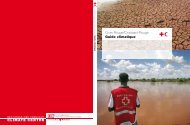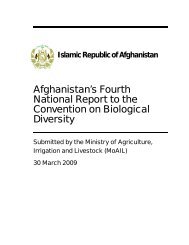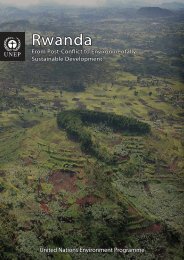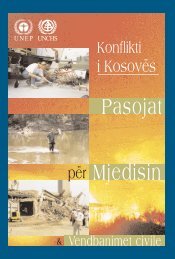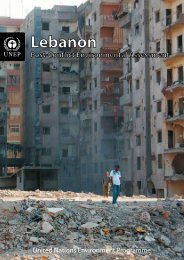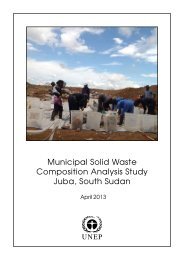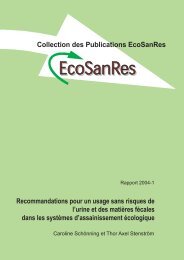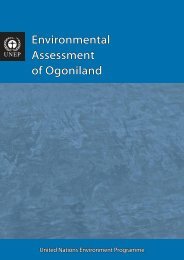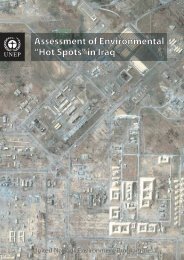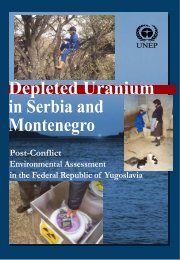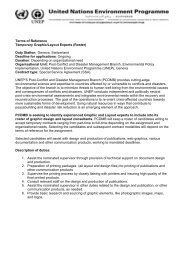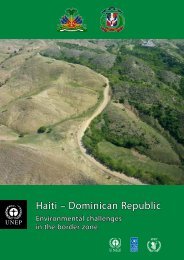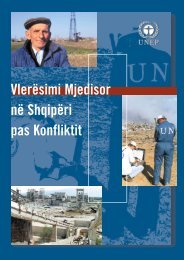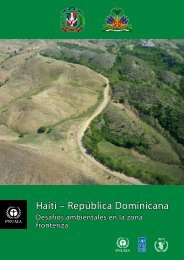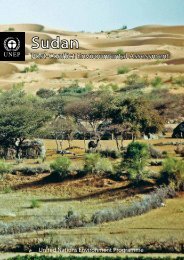- Page 3 and 4:
The views expressed in this publica
- Page 5 and 6:
iv Bush encroachment 60 Rehabilitat
- Page 7 and 8:
vi Grazing management 139 Sheep man
- Page 9 and 10:
viii Grazing lands, pasture and fod
- Page 11 and 12:
x Future 374 References 374 Chapter
- Page 13 and 14:
xii Herd management 474 Stocking ra
- Page 15 and 16:
xiv and environmental factors. Rese
- Page 17 and 18:
xvi or copied without her permissio
- Page 19 and 20:
xviii Glossary of technical terms a
- Page 21 and 22:
xx IUCN The World Conservation Unio
- Page 23 and 24:
Figure 1.1 Extent of the world’s
- Page 25 and 26:
2 Plate 1.2 Mosaic of cultivated cr
- Page 27 and 28:
4 Plate 1.4 Horse herd on grassland
- Page 29 and 30:
6 Grasslands of the world Plate 1.8
- Page 31 and 32:
8 Grasslands of the world Plate 1.1
- Page 33 and 34:
10 Grasslands of the world Plate 1.
- Page 35 and 36:
12 Grasslands of the world Plate 1.
- Page 37 and 38:
14 Grasslands of the world century.
- Page 39 and 40:
The above coverage leaves some obvi
- Page 41 and 42:
18 Grasslands of the world Riveros,
- Page 43 and 44:
20 Libyan Arab Jamahiriya Chad Cent
- Page 45 and 46:
22 Libyan Arab Jamahiriya Chad Cent
- Page 47 and 48:
24 Libyan Arab Jamahiriya Chad Cent
- Page 49 and 50:
26 Plate 2.2 Large non-ruminant her
- Page 51 and 52:
28 Libyan Arab Jamahiriya Chad Cent
- Page 53 and 54:
30 Libyan Arab Jamahiriya Chad Cent
- Page 55 and 56:
32 Grasslands of the world Plate 2.
- Page 57 and 58:
34 Grasslands of the world low pala
- Page 59 and 60:
36 Grasslands of the world is impor
- Page 61 and 62:
38 Grasslands of the world recently
- Page 63 and 64:
40 Grasslands of the world degradat
- Page 65 and 66:
42 Grasslands of the world leasehol
- Page 67 and 68:
44 Grasslands of the world However,
- Page 69 and 70:
46 Grasslands of the world technolo
- Page 71 and 72:
48 Grasslands of the world subsiste
- Page 73 and 74:
50 Grasslands of the world able to
- Page 75 and 76:
52 Grasslands of the world Plate 2.
- Page 77 and 78:
54 Grasslands of the world tall veg
- Page 79 and 80:
56 Grasslands of the world with wil
- Page 81 and 82:
58 Grasslands of the world fragment
- Page 83 and 84:
60 Libyan Arab Jamahiriya Chad Cent
- Page 85 and 86:
62 Grasslands of the world Reseedin
- Page 87 and 88:
64 Grasslands of the world last to
- Page 89 and 90:
66 Grasslands of the world Bourn, D
- Page 91 and 92:
68 Grasslands of the world Ellis, J
- Page 93 and 94:
70 Grasslands of the world the Euro
- Page 95 and 96:
72 Grasslands of the world Niamir,
- Page 97 and 98:
74 Grasslands of the world Schlesin
- Page 99 and 100:
76 Grasslands of the world Wilen, C
- Page 101 and 102:
78 Grasslands of the world INTRODUC
- Page 103 and 104:
80 Figure 3.2 The extent of grassla
- Page 105 and 106:
82 Grasslands of the world Plate 3.
- Page 107 and 108:
84 Grasslands of the world Figure 3
- Page 109 and 110:
86 Grasslands of the world PEOPLE H
- Page 111 and 112:
88 Grasslands of the world The gras
- Page 113 and 114:
90 Grasslands of the world Here, la
- Page 115 and 116:
92 Grasslands of the world crop res
- Page 117 and 118:
94 Grasslands of the world Grasslan
- Page 119 and 120:
96 Grasslands of the world Plate 3.
- Page 121 and 122:
98 Grasslands of the world These gr
- Page 123 and 124:
100 Grasslands of the world high fl
- Page 125 and 126:
102 Grasslands of the world product
- Page 127 and 128:
104 Grasslands of the world Figure
- Page 129 and 130:
106 Plate 3.5 Foggage Kikuyu for wi
- Page 131 and 132:
108 Grasslands of the world Plate 3
- Page 133 and 134:
110 Grasslands of the world zation
- Page 135 and 136:
112 Grasslands of the world imagery
- Page 137 and 138:
114 Grasslands of the world Kalahar
- Page 139 and 140:
116 Grasslands of the world impleme
- Page 141 and 142:
118 Grasslands of the world Grossma
- Page 143 and 144:
120 Grasslands of the world Trollop
- Page 145 and 146:
122 Grasslands of the world farming
- Page 147 and 148:
124 ������� ���
- Page 149 and 150:
126 Sheep numbers (millions) 20 15
- Page 151 and 152:
128 28 6 8 58 Title deed Legal occu
- Page 153 and 154:
130 Grasslands of the world into eq
- Page 155 and 156:
132 Figure 4.5 Biozones of Patagoni
- Page 157 and 158:
134 Grasslands of the world Semi-de
- Page 159 and 160:
136 Plate 4.3 A shrub steppe in the
- Page 161 and 162:
138 Grasslands of the world 2001).
- Page 163 and 164:
140 Grasslands of the world SHEEP M
- Page 165 and 166:
142 Grasslands of the world Patagon
- Page 167 and 168:
144 Grasslands of the world scarcit
- Page 169 and 170:
146 Grasslands of the world (Cavagn
- Page 171 and 172:
148 Grasslands of the world the gen
- Page 173 and 174:
150 Grasslands of the world In 1989
- Page 175 and 176:
152 TABLE 4.4 Complexity levels of
- Page 177 and 178:
154 Grasslands of the world could b
- Page 179 and 180:
156 Grasslands of the world of nort
- Page 181 and 182:
158 Grasslands of the world Bottini
- Page 183 and 184:
160 Grasslands of the world Reunió
- Page 185 and 186:
162 Grasslands of the world Ecolog
- Page 187 and 188:
164 Grasslands of the world Mainwar
- Page 189 and 190:
166 Grasslands of the world Oliva,
- Page 191 and 192:
168 Grasslands of the world Sain, C
- Page 193 and 194:
170 Grasslands of the world austral
- Page 195 and 196:
172 Figure 5.1 The Campos region of
- Page 197 and 198:
174 Grasslands of the world bezoart
- Page 199 and 200:
176 Grasslands of the world On the
- Page 201 and 202:
178 Grasslands of the world Product
- Page 203 and 204:
180 Grasslands of the world Some sp
- Page 205 and 206:
182 Plate 5.1 Landscape in the Sier
- Page 207 and 208:
184 Grasslands of the world Plate 5
- Page 209 and 210:
186 Grasslands of the world Salt de
- Page 211 and 212:
188 Grasslands of the world TABLE 5
- Page 213 and 214:
190 Grasslands of the world soils d
- Page 215 and 216:
192 (c) Grassland with Melica macra
- Page 217 and 218:
194 Grasslands of the world TABLE 5
- Page 219 and 220:
196 Figure 5.3 Forage offer (FO ) a
- Page 221 and 222:
198 Grasslands of the world which a
- Page 223 and 224:
200 Grasslands of the world Fertili
- Page 225 and 226:
202 Grasslands of the world their c
- Page 227 and 228:
204 Grasslands of the world Paspalu
- Page 229 and 230:
206 Grasslands of the world TABLE 5
- Page 231 and 232:
208 Grasslands of the world TABLE 5
- Page 233 and 234:
210 Grasslands of the world Researc
- Page 235 and 236:
212 Grasslands of the world It is n
- Page 237 and 238:
214 Grasslands of the world Subtrop
- Page 239 and 240:
216 Grasslands of the world (Argent
- Page 241 and 242:
218 Grasslands of the world para Ba
- Page 243 and 244:
Grasslands of central North America
- Page 245 and 246:
REX PIEPER REX PIEPER Grasslands of
- Page 247 and 248:
Grasslands of central North America
- Page 249 and 250:
S.G. REYNOLDS Grasslands of central
- Page 251 and 252:
MAE ELSINGER DUANE McCARTNEY Grassl
- Page 253 and 254:
JEFF PRINTZ, USDA-NRCS JEFF PRINTZ,
- Page 255 and 256:
S.G. REYNOLDS DUANE McCARTNEY Grass
- Page 257 and 258:
MAE ELSINGER Grasslands of central
- Page 259 and 260:
Grasslands of central North America
- Page 261 and 262:
MAE ELSINGER Grasslands of central
- Page 263 and 264:
Grasslands of central North America
- Page 265 and 266:
S.G. REYNOLDS Grasslands of central
- Page 267 and 268:
Grasslands of central North America
- Page 269 and 270:
MAE ELSINGER Grasslands of central
- Page 271 and 272:
Grasslands of central North America
- Page 273 and 274:
Grasslands of central North America
- Page 275 and 276:
Grasslands of central North America
- Page 277 and 278:
Grasslands of central North America
- Page 279 and 280:
Grasslands of central North America
- Page 281 and 282:
Grasslands of central North America
- Page 283 and 284:
Grasslands of central North America
- Page 285 and 286:
Grasslands of central North America
- Page 287 and 288:
266 Figure 7.1 Map of Mongolia . Pl
- Page 289 and 290:
268 TABLE 7.1 Land resources of Mon
- Page 291 and 292:
270 TABLE 7.3 Projected total popul
- Page 293 and 294:
272 Plate 7.5 Wheat was once grown
- Page 295 and 296:
274 Grasslands of the world made of
- Page 297 and 298:
276 Grasslands of the world four ho
- Page 299 and 300:
278 Plate 7.9 Saddle horses on hitc
- Page 301 and 302:
280 TABLE 7.5 Haymaking by producer
- Page 303 and 304:
282 Plate 7.11 Meadow grazing - Ark
- Page 305 and 306:
284 Grasslands of the world croppin
- Page 307 and 308:
286 TABLE 7.10 Evolution of stock n
- Page 309 and 310:
288 Plate 7.14 Polled yak in autumn
- Page 311 and 312:
290 Figure 7.3 Evolution of stock u
- Page 313 and 314:
292 Grasslands of the world of this
- Page 315 and 316:
294 Grasslands of the world TABLE 7
- Page 317 and 318:
296 Grasslands of the world can go
- Page 319 and 320:
298 Grasslands of the world arable
- Page 321 and 322:
300 Grasslands of the world regulat
- Page 323 and 324:
302 Grasslands of the world systems
- Page 325 and 326:
304 Grasslands of the world Suttie,
- Page 327 and 328:
306 Grasslands of the world Figure
- Page 329 and 330:
308 Plate 8.3 Harvested wheat in th
- Page 331 and 332:
310 Grasslands of the world Tang. T
- Page 333 and 334:
312 TABLE 8.1 Grassland types of th
- Page 335 and 336:
314 Plate 8.5 Poa alpina . Plate 8.
- Page 337 and 338:
316 Grasslands of the world precipi
- Page 339 and 340:
318 Grasslands of the world TABLE 8
- Page 341 and 342:
320 Grasslands of the world of the
- Page 343 and 344:
322 Plate 8.11 Kokonor camp with th
- Page 345 and 346:
324 Plate 8.14 Milk collection. Pla
- Page 347 and 348:
326 Grasslands of the world The num
- Page 349 and 350:
328 Grasslands of the world part of
- Page 351 and 352:
330 Grasslands of the world Plate 8
- Page 353 and 354:
332 Grasslands of the world 340 000
- Page 355 and 356:
334 Plate 8.20 Longri summer camp.
- Page 357 and 358:
336 Grasslands of the world There i
- Page 359 and 360:
338 Grasslands of the world Clarke,
- Page 361 and 362:
340 Grasslands of the world Kush-Hi
- Page 363 and 364:
342 Grasslands of the world William
- Page 365 and 366:
344 Grasslands of the world grazing
- Page 367 and 368:
346 Grasslands of the world Growing
- Page 369 and 370:
348 Grasslands of the world that co
- Page 371 and 372:
350 Grasslands of the world cessati
- Page 373 and 374:
352 Grasslands of the world This zo
- Page 375 and 376:
354 Figure 9.2 Natural vegetation z
- Page 377 and 378:
356 Grasslands of the world or loam
- Page 379 and 380:
358 Grasslands of the world after r
- Page 381 and 382:
360 6 000 4 000 2 000 0 (a) Queensl
- Page 383 and 384:
362 Grasslands of the world Tropica
- Page 385 and 386:
364 Grasslands of the world AVAILAB
- Page 387 and 388:
366 Grasslands of the world Plate 9
- Page 389 and 390:
368 Grasslands of the world from th
- Page 391 and 392:
370 Grasslands of the world grassla
- Page 393 and 394:
372 Grasslands of the world Plate 9
- Page 395 and 396:
374 Grasslands of the world FUTURE
- Page 397 and 398:
376 Grasslands of the world Hall, T
- Page 399 and 400:
378 Grasslands of the world Martin,
- Page 401 and 402:
380 Grasslands of the world Wilson,
- Page 403 and 404:
382 Figure 10.1 Extent of grassland
- Page 405 and 406:
384 Grasslands of the world with su
- Page 407 and 408:
386 Grasslands of the world was to
- Page 409 and 410:
388 Plate 10.1 Agropyron pectinifor
- Page 411 and 412:
390 Plate 10.3 Festuca sulcata Gras
- Page 413 and 414:
392 Grasslands of the world The FSU
- Page 415 and 416:
394 Grasslands of the world thinkin
- Page 417 and 418:
396 TABLE 10.4 Climate data of the
- Page 419 and 420:
398 Plate 10.5 Kochia prostrata Pla
- Page 421 and 422:
400 Plate 10.7 Forest -steppe with
- Page 423 and 424:
402 Grasslands of the world Young f
- Page 425 and 426:
404 Plate 10.9 Poa bulbosa. Grassla
- Page 427 and 428:
406 Grasslands of the world shade-l
- Page 429 and 430:
408 Grasslands of the world Physica
- Page 431 and 432:
410 Grasslands of the world Mikheev
- Page 433 and 434:
412 Grasslands of the world it was
- Page 435 and 436:
414 Grasslands of the world of grou
- Page 437 and 438:
416 Grasslands of the world Vil’y
- Page 439 and 440:
418 Plate 11.1 Trifolium fragiferum
- Page 441 and 442:
420 Plate 11.2 Millet, a major crop
- Page 443 and 444:
422 Grasslands of the world Plate 1
- Page 445 and 446:
424 Grasslands of the world sudania
- Page 447 and 448:
426 Grasslands of the world perenni
- Page 449 and 450:
428 Plate 11.8 Park grasslands in N
- Page 451 and 452:
430 Grasslands of the world In Para
- Page 453 and 454:
432 Plate 11.10b A grassland domina
- Page 455 and 456: 434 Grasslands of the world the nor
- Page 457 and 458: 436 Grasslands of the world remaini
- Page 459 and 460: 438 Plate 11.15 Small ruminants on
- Page 461 and 462: 440 Plate 11.19 Qinghai - motorcycl
- Page 463 and 464: 442 Plate 11.21 Leymus chinensis .
- Page 465 and 466: 444 Plate 11.22 The Himalaya -Hindu
- Page 467 and 468: 446 Plate 11.24 Transhumant Kuchi f
- Page 469 and 470: 448 Grasslands of the world grazing
- Page 471 and 472: 450 Plate 11.27 Delivering fodder t
- Page 473 and 474: 452 Plate 11.29 Syrian rangeland ha
- Page 475 and 476: 454 Grasslands of the world tains.
- Page 477 and 478: 456 Grasslands of the world Turkey
- Page 479 and 480: 458 Plate 11.31 Sainfoin (Onobrychi
- Page 481 and 482: 460 Grasslands of the world Gintzbu
- Page 483 and 484: Grassland perspectives 463 Chapter
- Page 485 and 486: Grassland perspectives 465 as well
- Page 487 and 488: ALICE CARLONI ALICE CARLONI Grassla
- Page 489 and 490: Grassland perspectives 469 The gras
- Page 491 and 492: Grassland perspectives 471 Trees an
- Page 493 and 494: Grassland perspectives 473 is lost.
- Page 495 and 496: Grassland perspectives 475 breeding
- Page 497 and 498: Grassland perspectives 477 traditio
- Page 499 and 500: Grassland perspectives 479 the numb
- Page 501 and 502: Grassland perspectives 481 to sown
- Page 503 and 504: S.G. REYNOLDS SARDI Grassland persp
- Page 505: MAGNUS HALLING SARDI Grassland pers
- Page 509 and 510: MARZIO MARZOT Grassland perspective
- Page 511 and 512: S.G. REYNOLDS Grassland perspective
- Page 513 and 514: Grassland perspectives 493 extremel
- Page 515 and 516: Index 495 A Acacia spp. 31, 34, 36,
- Page 517 and 518: Index 497 B Baccharis spp. 175, 182
- Page 519 and 520: Index 499 Chamaecrista spp. 199, 37
- Page 521 and 522: Index 501 ciliatum 199 elegans 199
- Page 523 and 524: Index 503 fl echillares 176, 177 fl
- Page 525 and 526: Index 505 I Imperata spp. 3, 442, 4
- Page 527 and 528: Index 507 sheep 288, 323, 326, 330
- Page 529 and 530: Index 509 Poa spp. 133, 134, 135, 1
- Page 531 and 532: Index 511 Sheep 14, 15, 38, 39, 84,
- Page 533 and 534: Index 513 Tiller density 204 Touris



